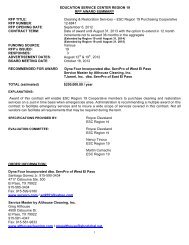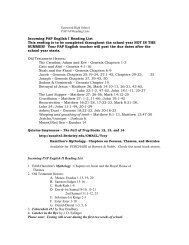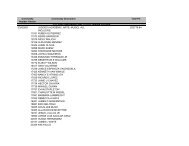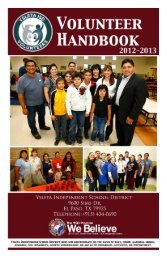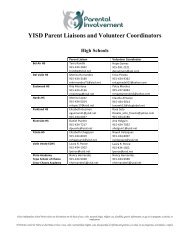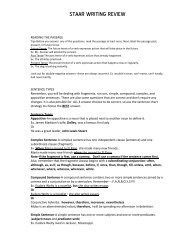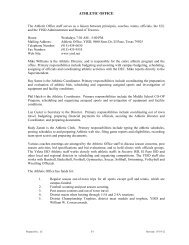Student/Parent Handbook - Ysleta Independent School District
Student/Parent Handbook - Ysleta Independent School District
Student/Parent Handbook - Ysleta Independent School District
You also want an ePaper? Increase the reach of your titles
YUMPU automatically turns print PDFs into web optimized ePapers that Google loves.
Measles, Mumps, and Rubella (MMR) – The first dose of MMR must be received on or after the 1st birthday. For K -3rd grade, 2 doses of MMR are required. For 4th - 12th grade, 2 doses of a measles-containing vaccine, and one doseeach of rubella and mumps vaccine is required.Hepatitis B – For students aged 11-15 years, 2 doses meet the requirement if adult hepatitis B vaccine (Recombivax)was received. Dosage and type of vaccine must be clearly documented. (Two 10 mcg/1.0 ml of Recombivax).Varicella – The first dose of varicella must be received on or after the first birthday. For grades K - 3rd and 7th - 10th 2doses are required. 1 dose is required for all other grade levels. For any student who receives the first dose on or after 13years of age, 2 doses are required.Hepatitis A – The first dose of hepatitis A must be received on or after the first birthday.This information is subject to change - Contact your school nurse for current information.EXEMPTIONSThe law allows (a) physicians, licensed in the State of Texas, to write a statement stating that the vaccine(s) required ismedically contraindicated or poses a significant risk to the health and well-being of the child or any member of the child'shousehold, and (b) parents/guardians to choose an exemption from immunization requirements for reasons conscience,including a religious belief. <strong>School</strong>s and child-care facilities should maintain an up-to-date list of students withexemptions, so they can be excluded from attending school if an outbreak occurs. Instructions for the affidavit to besigned by parents/guardians choosing the exemption for reasons of conscience, including a religious belief can be foundat www.ImmunizeTexas.com. For children needing medical exemptions, a written statement by the physician, licensed inthe State of Texas, should be submitted to the school or child-care facility.BACTERIAL MENINGITIS: Meningococcal disease is a serious illness caused by bacteria that infect the blood ormembranes surrounding the brain and spinal cord. It can lead to brain damage, disability, and death. It is most commonin infants and in people with certain medical conditions. College freshmen, particularly those who live in dorms, have amodestly increased risk of getting the disease. Common symptoms of meningitis include stiff neck, headache, fever,sensitivity to light, sleepiness, confusion, and seizures. It can be treated with antibiotics, but treatment must be startedearly. Despite treatment, 10-15% of people who get the disease die from it. Another 10-20% suffer long-termconsequences.A meningococcal vaccine is available from your doctor or health clinics. It protects against four of the five most commontypes of this disease. Vaccine protection lasts 3-5 years and can prevent 50%-70% of cases on college campuses.Meningococcal vaccine may cause reactions such as pain or fever. Discuss contraindications and rare but serious sideeffects with your healthcare provider. For further information contact your school nurse or healthcare provider. (PolicyFFAD)Bacterial MeningitisState law specifically requires the district to provide the following information:What is meningitis?Meningitis is an inflammation of the covering of the brain and spinal cord. It can be caused by viruses, parasites,fungi, and bacteria. Viral meningitis is most common and the least serious. Bacterial meningitis is the mostcommon form of serious bacterial infection with the potential for serious, long-term complications. It is anuncommon disease, but requires urgent treatment with antibiotics to prevent permanent damage or death.What are the symptoms?Someone with meningitis will become very ill. The illness may develop over one or two days, but it can also rapidlyprogress in a matter of hours. Not everyone with meningitis will have the same symptoms.Children (over 1 year old) and adults with meningitis may have a severe headache, high temperature, vomiting,sensitivity to bright lights, neck stiffness or joint pains, and drowsiness or confusion. In both children and adults,there may be a rash of tiny, red-purple spots. These can occur anywhere on the body.The diagnosis of bacterial meningitis is based on a combination of symptoms and laboratory results.How serious is bacterial meningitis?11




